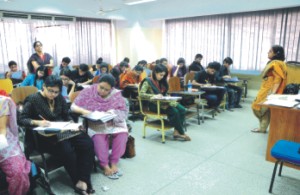Perceptions
Authoritativeness or friendliness:
Our teachers' classroom dilemma
Nasrin Pervin
 |
Photo: Yamin Tauseef Jahangir
|
New-years eve as usual. Messages started pouring in and by midnight it was chaotic. I was sending as well as receiving them with enthusiasm. This year, however, was different. I got a few wishes from my students, you couldn't tell the difference. They read the same as the ones I received from my friends. My husband pointed out with a hint of amusement, “Do these students respect you at all?” I could see what made him pose that question. Messages are usually exchanged between people who are socially equal; student-teacher relationships in the traditional sense means keeping a distance, upholding certain pretences despite how outdated it may appear.
Well, at that moment a thought came to my mind: How should a teacher-student relation be, especially in our context, where the dynamics are extremely conventional and stereotyped, and traditionally is based on complete authoritativeness on the teacher's part. Students are expected to show unconditional respect and commitment to the teacher. They must take it for granted that what a teacher says is correct.
I remember an incident when I was at Nottingham Trent University. A foreign student from Nepal put his leg up on the desk while he was munching on crisps. Not an unusual posture when a student when he is not in a classroom. A teacher passed by. The local students barely noticed the teacher and my Nepalese friend also seemed quite oblivious of his presence. Of course this behaviour is unthinkable in a third world country classroom setting, but the friend was getting along with his new found role of a Western student.
The teacher went to his room quietly and sent for the student. He demanded to know why he behaved disrespectfully to which the student replied this was not an unusual gesture in the West. “I know”, the teacher said, “but where you come from- this is not a common practice there. You show me the respect as you would to a teacher in your home country”. In reality, contextually I did find the teacher's response a bit unusual but he was an experienced, elderly person. He had a point.
In the West, professional relationships such as that between a solicitor and a client, or a doctor and a patient are strictly governed by rules and monitored by the governing bodies of the profession. In our country, the conventional values and social mores set the tone for teacher-student relationships. Teachers are provided with full authority over the students. This, in turn, produces power imbalance in the relationship, placing the teacher in a more powerful and dictatorial position. The power imbalance that arises in teacher-student relationship in many situations places the teacher in the role of an autocrat.
There is no universal prescription to define the ideal standard of a teacher-student relationship. Any relationship between two persons depends on socio-cultural context, age groups, as well as individual beliefs. Despite this reality, we can draw a basic principle for effective teacher-student relationship considering our socio-cultural ethos, student-teacher psychology and modern teaching methodology. We should remember that the expectation from a teacher in our society is quite high. The general expectation is that a teacher should be a role model in the eyes of the students. Keeping this in mind, teachers should build effective, efficient and pragmatic relationships with their respective students. However, teachers should not misuse the authoritarian power vested upon them by virtue of their social status. Rather, teachers should earn certain attributes so that students naturally obey the teachers with respect. Some of these attributes are: sound knowledge in the subject taught, honesty, integrity and sincerity to keep the commitment.
Teachers' perceptions of students and their learning and the teachers' attitudes towards their own teaching are fairly important, because they deeply affect students' interest in learning. I believe a great teacher is one who can break out of the traditional authoritativeness and play the role of a facilitator. That way, real learning can take place in the classroom and the teacher can spontaneously extract a learner's love and respect.
(The writer is an ELT Lecturer at North South University)
| 